- Home
- Lissa Evans
Crooked Heart Page 13
Crooked Heart Read online
Page 13
Over the past thirteen days, he’d taken Hilde to the pictures three times and to the Abbey Tea Rooms twice, and she’d not smiled once, though he’d noticed that the first taste of an eclair had lifted her mood a little. On their last meeting he’d presented her with a marcasite brooch in the shape of a bow, which she’d scrutinized gravely, and at the hostel gate that evening she’d let him kiss her, a brief dry brush of lips which had left him filleted.
In the parlour, he sat down, closed his eyes and saw Hilde; it was as if the inside of his head was a room, plastered with her photograph. In it, she was wearing her grey mac and her knitted tam. She had never actually taken either of them off during their meetings, and he tried to wrench his mind away from the scarcely bearable fantasy that she was wearing nothing at all beneath her coat. Certainly, her legs were always stockingless, the skin of her calves as pale as watered milk. He thought again of her feet, her tiny feet. She had mentioned, last time, that she had no nail-scissors, and he had spent an entire day trying to buy some in St Albans, and had been forced, in the end, to purloin his grandmother’s pair with the mother-of-pearl handles. He slipped a hand into his breast pocket to check they were still there and his fingers met the other little gift he had for her.
There was a step outside the door and his eyes snapped open.
‘I am very, very tired,’ said Hilde. ‘Birgit talked in her sleep for the whole night and I have had one hour in total.’
He saw, with a shock, that she was wearing something different: a maroon beret that didn’t hide as much of her hair as the tam, so that he could confirm what he had guessed: that it was not only dark but very curly.
‘I’ve brought you these,’ he said, producing the nail-scissors.
‘Thank you.’
‘And this,’ he added, bringing out the ham; he would save the final gift until later. Hilde studied the picture on the tin.
‘Not enough fad,’ she said. ‘By my house the ham had fad this wide.’ She held her finger and thumb an inch apart. ‘But I will take it upstairs and hide it while Birgit is out.’ She disappeared again, leaving just a hint of mothballs. From somewhere within the house came the crash of pans, and the snipped tones of a wireless announcer.
‘I am too tired to go all the way into the town,’ announced Hilde, returning.
‘We could get the bus.’
‘Bus,’ she said with contempt. ‘In Wiener Neustadt we had a Tatra 57. It was cream and dark red.’
‘You can’t get the petrol here.’
‘I would think that people who work for the government would get petrol.’
‘Yes, but I can’t arouse suspicion. I have to get around like everyone else, keep a low profile. They warned me about that early on, it was part of the training.’
‘I see.’
‘So, is there anything else you fancy?’
‘Fancy?’ She frowned, missing his meaning. ‘Nothing is fancy here, there is nothing that is nice to see, or buy or touch. The blanket on my bed upstairs I would not give to a horse. In Wiener Neustadt we had a silk cover on the ottoman as smooth as the ice. You would sid on it and slide.’
He had an image of her white body slipping across an ottoman and for a moment was unable to speak.
‘I meant, is there anything else you’d like to do?’ he asked, hoarsely. ‘What about a walk in the wood? It’s dry out.’
The path was a ribbon of fallen leaves.
‘You’re starting nights, aren’t you?’ Donald asked, after a hundred yards of silence.
‘Yes.’
‘How long for?’
‘A month.’ She stopped walking. ‘There is mud under the leaves. I only have one pair of good shoes.’
‘We could sit down.’ There was a convenient fallen bough; he took off his jacket and draped it over the lichened bark. Hilde sat hunched, her arms wrapped around her shoulders.
‘Are you cold?’
‘No.’
He felt in his pocket. ‘I’ve got another present for you,’ he said. He drew it out, a slim packet that he’d swathed in a clean handkerchief and tied with string. She unknotted the latter carefully, winding it round her hand before unwrapping the square of cotton. There was a short, surprised pause, and her face seemed to brighten; she looked suddenly very young.
‘For skedging?’
‘Yes.’
Delicately, she opened the box and withdrew one of the sticks, holding it cautiously between her fingertips.
‘I do not know the English word.’
‘Charcoal.’
‘But it weighs nothing,’ she exclaimed. There was a pale patch on the branch beside her, where the bark had been stripped away by a squirrel or a bored child, and she bent and wrote the letter ‘A’.
‘Will you draw something for me, Hilde?’
‘I have no paper.’
‘I can get you some.’
‘It has to be correct paper. For skedging. Any paper will not do.’ She glanced at her smudged fingers and frowned as if she hadn’t expected to see them marked.
‘Is charcoal different in Austria, then?’ he asked, and she threw him a furious look.
‘No. Just the same. Exactly.’ Quickly, she put the stick away. Her face was no longer bright, but sealed shut, like a slammed door. She stood up and started walking fast, back towards the hostel, and Donald hurried after her.
‘What’s the matter, Hilde?’
‘I’m tired. I am tired all the time.’
‘I wish you didn’t have to work.’
‘I wish it too.’
‘I wish you’d let me look after you.’ He caught her by one shoulder and she swatted at his hand as if it were a horse-fly, and carried on walking.
‘I’ll get you the special sketching paper,’ he called after her. She didn’t turn.
‘I’ll get you a motor car.’
She stumbled and he hurried to catch up with her.
‘I will,’ he said. ‘I’ll get you anything you want. Anything. Make a list. Long as you like.’
This time when he touched her shoulder, she stopped and leaned against him and the soft weight of her body seemed to turn him inside out.
‘My home,’ she said. ‘I want my own home.’
Later, walking back into town, he tried to remember how much was in the shoebox he kept under the bed, and in the Gladstone bag on top of the wardrobe. One thing was certain: he was going to need more.
10
Before leaving the flat, Vee sprinkled a little rose water on to her handkerchief. She and Noel had made three further visits to Hornsey Rise over as many weeks and Mrs Gifford had happily donated sixty-three pounds seven shillings and a bone button, but on the second occasion she had unearthed an album of photographs from some crusted corner and had spent a good forty minutes going through it – a barmy flow of half-completed anecdotes: this is Bunny you met her in Dorset such a lovely girl with hair down to her unmentionables she survived the Lusitania by climbing up on a table and this is Celia at the march can you see how tall she is she could throw a stone clear over the statue of this is Alethea, we’ll be seeing her later she’s popping over from Little Venice if she’s back from Ralfie Henderson’s house party, well of course you were there, weren’t you, did you try the punch, I believe it contained absinthe . . . In the dim light, one grey smudge had looked much the same as the next and Vee had staggered out into the twilight with spots before her eyes and the smell of unwashed knickers clinging to the folds of her coat. ‘Next time she gets out the album, tell her we’ve got to go because we’re meeting Bunny at Ralfie’s in ten minutes,’ she’d said to Noel, but he hadn’t found it funny; he was still rather po-faced about the old besom.
The banknotes were in a secret hiding place in Vee’s room; one more visit to Hornsey and she’d take them to the garage. She was looking forward to seeing the shock on Harry Pedder’s face. The small change she’d already spent on a black-and-white scarf in La Mode and a pair of grey leather gloves from the stall at the good
end of the market. The gloves were as pale as ash and as soft as a baby’s bottom; she hadn’t worn them yet – just kept them in her bag and touched them every now and again. She’d bought a book of detective stories for Noel too, from the second-hand shop under the flat, and he’d read them in an evening, deaf to conversation, not even looking up when she’d dropped a tray. ‘I might try reading one myself,’ she’d said, though she didn’t quite mean it, couldn’t imagine having the time to sit and flip through pages. In any case, spending the money had been as good as a holiday. If she’d had to choose between a week at the seaside and the opening snap of a purse full of coins, she knew which she’d settle for . . .
‘Here, sonny,’ said a man who’d squeezed on to the train at West Hampstead. ‘Do you want this? I found it on the platform. I know what you kids are like about shrapnel.’ Noel took the heavy brass disc, one side shiny, the other dull and stinking of explosive.
‘It’s the base of an AA shell,’ said the man, encouragingly, as if he’d handed Noel a kitten and was urging him to tickle it under the chin. ‘Bit of a find, that.’
‘Ooh, what do you say to the gentleman?’ asked Vee, giving him a nudge.
‘Thank you.’
‘Thank you,’ repeated Vee, trying to camouflage Noel’s lack of enthusiasm. Her gaze, though, had already strayed back to the window. In the week since they’d last travelled into London, the Luftwaffe had kicked lumps out of the north-west suburbs. Odd gaps had appeared in the streets at right angles to the line, glimpses of indoor plumbing, sprigged wallpaper, a picture askew on the wall of a floorless room; but it was the terraces that ran alongside the railway that had really caught it – whole rows tipped over, as if Gulliver had stood at one end and given a push, leaving a slush of bricks topped with slate. Poor people’s houses, she thought, jerry-built and Jerry-wrecked.
The compartment door slid open. ‘Just to tell you,’ said a level voice behind the usual crush of khaki, ‘the wobbler’s sounded at Hampstead, so once we get there we’ll be stopping at the station until further notice. Blinds down, please, and we advise passengers to lie on the floor for their own safety.’
There was a derisive laugh. ‘I’ve seen blokes spit on this floor,’ called someone. ‘You going to pay for the sanatorium when I get TB?’
‘Damn sight cheaper than paying for your head to be sewn back on.’
There was another laugh, less hearty than the first.
Vee helped to pull the blind down, and the train crept forward in darkness. They could hear the swoop of the siren now.
‘Probably another false alarm,’ said a woman. ‘We had Lord knows how many yesterday.’
And then, from beneath the siren, a low, irritable buzz, like a fly trapped under a blanket.
Vee put out a hand for Noel, and encountered one of his ears.
‘You all right?’ she asked, giving it a pat.
‘Yes.’ He didn’t sound too certain.
The fly was joined by another fly; there was a series of distant dull bangs, like someone stamping on a cardboard box, and then, tremendously loud, the stutter of guns.
‘That’ll teach ’em,’ said someone, venomously.
At the station, the train emptied and Vee and Noel spent an hour in a dank basement shelter beneath the waiting rooms before the all-clear sounded. The air outside smelled sweet and autumnal. ‘You’d think we were smack in the woods,’ said Vee, looking round. Hampstead Heath station was in a cut, and there was nothing to see but a scrubby embankment, with a palisade of red-brick mansions at the top.
‘Come on, then,’ she said, gesturing towards the train, but Noel stood as if planted in cement, his head turned towards the station exit.
‘Dulce Domum,’ he said.
‘Are you ever going to speak in English?’
‘Home Sweet Home. In The Wind in the Willows, they walk past Mole’s house, and he smells it and he can’t bear not to go back and take a look at it.’ He knew the illustration so well, Mole’s snout raised yearningly, Ratty scurrying on oblivious.
‘What?’ Exasperated, Vee looked at the station clock. ‘It’s already four,’ she said. ‘That warden’ll be going on shift.’
‘Oh, please.’
Vee had never heard him use that word before; he had never asked for anything, only demanded, or waited silently and infuriatingly until she at last gave in.
‘So your godmother’s house is near here?’
‘A ten-minute walk. Please, Mss Sedge.’ Another first, though there was something about the way he said her name that sounded odd.
She gestured him towards the exit and then had to hurry to catch up. They crossed a road and were straight away among tall trees, on a sandy path. Up ahead, she could hear a chorus of ducks.
‘Did you . . .’ she turned his words over in her mind, ‘. . . did you call me Miss Sedge just now?’
‘I might have done. Accidentally.’
‘It’s Mrs.’
He shrugged. ‘All right,’ he said. ‘Only it honestly doesn’t matter to me. My parents weren’t married either. Mattie says that legitimacy is overvalued as a gauge of—’
She dragged him round to face her, and bent down so that she was on a level with his ears. ‘It’s Mrs,’ she hissed. ‘I’m a widow. I married a man called Samuel Sedge and he passed on fourteen years ago, so don’t give me one of your lectures. You don’t know everything. You might be clever and have been to a good school but you don’t know everything. You don’t.’ Her throat was closing like a fist, and she turned away and gave her own cheek a vicious pinch. It had worked in the past; it didn’t quite work now.
Behind her, a small, almost unrecognizable voice said, ‘Sorry.’
She nodded, tightly.
They carried on walking, and the curve of the path brought them out by a broad pond.
‘Wish we had some bread,’ said Noel, subdued.
‘Bread?’
‘For the ducks. I didn’t intend to make you upset. It was only that it seemed odd, your mother being Mrs Sedge and you being Mrs Sedge as well, and I put two and two together.’
‘Well, you need to work at your sums,’ she said, sharply. ‘He was a second cousin. Older than me.’
‘Your cheek’s bleeding.’
She gave it a swipe.
Five years of bloody hell. She hadn’t expected much out of the marriage. He’d been maimed during the Great War and was living off a tiny pension and odd jobs, but she didn’t have much choice (seven months pregnant with Donald) and God knows he’d needed a wife; he’d been eating bread and scrape for every meal and the inside of his cottage looked like a shed, one chair, no curtains, clean but lifeless. She hadn’t expected much out of it, but she’d got less, seeing as how Wipers hadn’t only taken his left arm above the elbow, but part of his mind as well. He never slept, she never saw him sleep, not once. As time went on, he’d stopped speaking and then had taken to his bed. He’d ended up in Doulton Grange Asylum and had died at forty-two, face down in a pond in the hospital grounds, and seeing as the water was only two inches deep it had been ruled a suicide secondary to chronic melancholia, which meant that she didn’t even get a widow’s pension. All a disaster.
‘It’s still bleeding,’ said Noel, and he held out a handkerchief.
‘Thank you.’ She pressed it to her eyes and then her cheek.
They were crossing a square of heathland now, having taken some complicated path through an elder thicket, and there still wasn’t a sign of a house.
‘You wouldn’t know you were in London,’ she said. ‘Much further, is it?’
‘No.’ She followed him round a stand of birch trees and through a hole in a hedge and saw a sunken lane sneaking off to the right.
Noel scrambled down to it and started to run, past the green-painted gate of Mrs Holroyd, the clematis arch of the Wimbournes, the rustic pergola of Major Lumb. Vee caught up with him at Mattie’s front gate and together they looked at the four-square villa, up to its windowsills in grass,
but otherwise unchanged.
‘It’s a palace,’ said Vee. ‘Look at the size of it . . .’
There was no need to ask whether anyone was living there; ivy was actually growing across the door frame.
‘Do you want to try and get in?’ she asked.
Noel thought of the mess within and shook his head. ‘I just wanted to make sure it was still here.’ All the time they’d been in the underground shelter, he’d been imagining a smoking crater, singed pages floating above the ruins. ‘We can go now,’ he said.
Vee lingered, gazing up at the frontage. ‘I’m surprised it’s not been rented on. Nice place like this.’ She looked round and saw that Noel was already heading off, picking his way between the ruts. She hurried after him. The lane sloped upward; a single lorry was parked at the top, the cab empty.
‘Well, heavens above,’ said Vee, breathless. ‘What is this, the Cheddar Gorge?’
In front of them was a giant excavation, ninety yards across, littered with empty sacks.
Noel took a deep breath. ‘This is where I found Mattie,’ he said, speaking rapidly and without inflection. ‘She left the house when it was dark, and I couldn’t find her until I went out again the next morning. She was right near the bottom of the pit and she was half-buried in sand, otherwise she would have frozen to death. Her feet were navy blue, and the hospital said they were frostbitten, the skin came up in blisters that looked exactly like purple grapes and they were going to have to amputate her legs at the knee only she died the night before the operation. I thought she was dead when I found her because her face was grey but then she groaned, and I covered her up with the beaver coat and then I found I couldn’t climb up the same way that I came down, I kept causing avalanches.’
‘How did you get up?’ asked Vee.
‘I went to the far side, and there was a tree root sticking out, like a rope. When I got to the top . . .’ He frowned, thinking about it; there’d been an icy mist, knee-height, and a buttery sun, bright but heatless.
‘What?’ asked Vee.
‘. . . I saw an enormous dead log, with a pattern on it, a black-and-white pattern. And then I saw it wasn’t a pattern, it was a flock of magpies, and there were ten of them. I kept thinking it must mean something significant.’

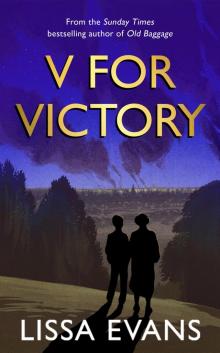 V for Victory
V for Victory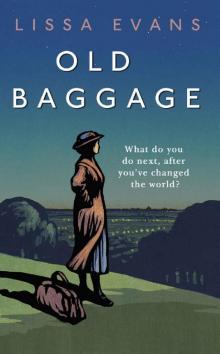 Old Baggage
Old Baggage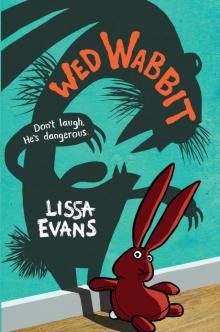 Wed Wabbit
Wed Wabbit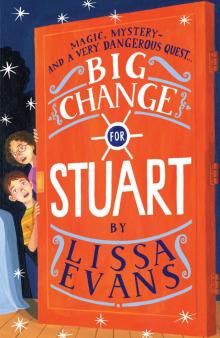 Big Change for Stuart
Big Change for Stuart Spencer's List
Spencer's List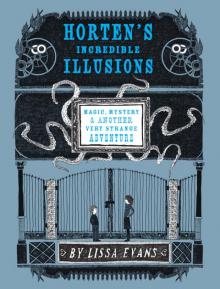 Horten's Incredible Illusions
Horten's Incredible Illusions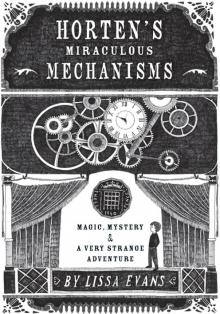 Horten's Miraculous Mechanisms
Horten's Miraculous Mechanisms Their Finest Hour and a Half
Their Finest Hour and a Half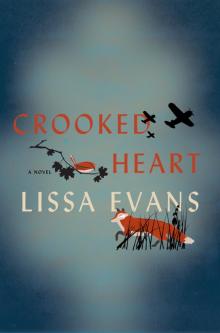 Crooked Heart
Crooked Heart